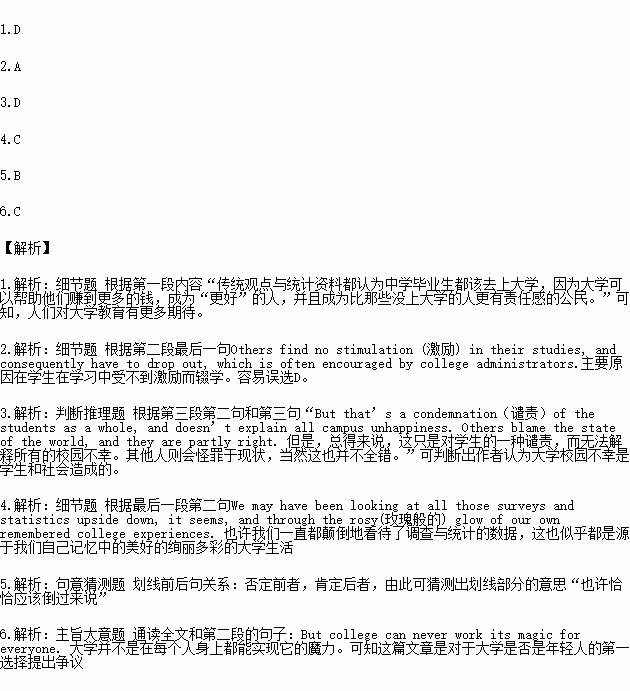题目内容
There is no denying that for more than a generation college education has been accepted without the slightest doubt. All high school graduates ought to go, says conventional wisdom and statistical evidence, because college will help them earn more money, become “better” people, and learn to be more responsible citizens than those who don’t go.
But college has never been able to work its magic for everyone. And now that close to half our high school graduates are attending, those who don’t fit the pattern are becoming more numerous, and more obvious. College graduates are selling shoes and driving taxis; college students interfere with each other’s experiments and write false letters of recommendation in the fierce competition so as to get admitted into graduate schools. Others find no stimulation (激励) in their studies, and consequently have to drop out, which is often encouraged by college administrators.
Some observers say the fault is with the young people themselves--they are spoiled and they are expecting too much. But that’s a condemnation(谴责)of the students as a whole, and doesn’t explain all campus unhappiness. Others blame the state of the world, and they are partly right. We have been told that young people have to go to college because our economy can’t absorb an army of untrained eighteen-year-olds. But disappointed graduates are learning that it can no longer absorb an army of trained twenty-two-year-olds, either.
Some campus watchers have openly begun to suggest that college may not be the best, the proper, the only place for every young person after the completion of high school. We may have been looking at all those surveys and statistics upside down, it seems, and through the rosy(玫瑰般的) glow of our own remembered college experiences. Perhaps college doesn’t make people intelligent,ambitious, happy,liberal, or quick to learn things—maybe it is just the other way around, and intelligent, ambitious, happy, liberal, quick-learning people are merely the ones who have been attracted to college in the first place. And perhaps all those successful college graduates would have been successful whether they had gone to college or not. This is heresy (异端邪说) to those of us who have been brought up to believe that if a little schooling is good, more has to be much better. But contrary evidence is beginning to come up.
1.According to the first paragraph, ___________________.
A. people now no longer challenge college education.
B. people still have a low opinion of college education.
C. the author thinks youngsters should all go to college.
D. people have great expectations for college education.
2.More young people drop out of college because _________.
A. they are no longer motivated in their studies.
B. they can start selling shoes and driving taxis.
C. they compete for admission to graduate schools.
D. college administrators encourage them to do so.
3.Who does the author think is to blame for campus unhappiness?
A. young students who are all spoiled and expecting too much.
B. our society that can’t offer enough jobs to college graduates.
C. our society that has not enough jobs for high school graduates.
D. young people as well as our society are to blame for all this.
4.Which of the following statements is TRUE about those surveys statistics?
A.They proved wrong as being comtradictory to our college experiences.
B.They are so convincing that we think of our rosy college experiences.
C.They may have been misread because of our rosy college experiences.
D.They proved high school graduates are smarter than college graduates
5.What is the meaning of the underlined sentence in Paragraph4?
A.It is a different way
B.It is just the opposite
C.It is the wrong way
D.There’s no other way
6.What is the main purpose of this passage?
A.To inform young people college education is no longer important now.
B.To prove college education doesn’t make young people more intelligent
C.To argue against the idea that college is the first choice for all youngsters
D.To tell young people that there’s something wrong with college education
 快捷英语周周练系列答案
快捷英语周周练系列答案
